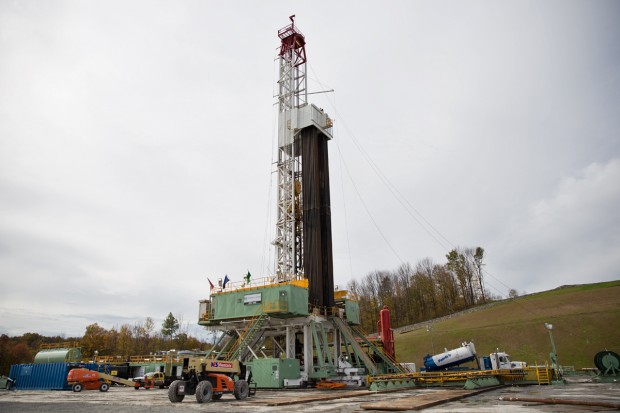Commonwealth Court throws out several challenges to Act 13, including ‘doctor gag rule’ [UPDATED]
-
Susan Phillips -
Katie Colaneri

Lindsay Lazarski / WHYY
Pennsylvania’s Commonwealth Court has upheld several sections of the state’s oil and gas law, including a provision dealing with doctors’ access to the chemicals used in hydraulic fracturing.
This post has been updated to include additional comments on the ruling.
Pennsylvania doctors have nothing to worry about when it comes to the so-called “gag order” on chemical exposures from oil and gas drilling. That’s the message from the Commonwealth Court today in a much-anticipated ruling on provisions of the state’s two-year-old oil and gas law. The court issued the ruling after the Supreme Court passed on the controversy, sending it back to the lower court.
The “gag rule” stems from a section of Act 13, which requires nondisclosure agreements from healthcare providers who seek information on chemical exposures, which may be deemed “confidential” by industry. The law, which was drafted without the knowledge or consultation of healthcare providers, forces doctors to sign a nondisclosure agreement, thereby agreeing not to share any ingredients in the industry’s secret sauce used to frack and drill for natural gas.
Writing for the Commonwealth Court, President Judge Dan Pellegrini says the law is not unconstitutional, and it neither prevents healthcare providers from obtaining the necessary information or sharing it with other health practitioners.
“It just reinforces the muddiness”
Governor Corbett’s administration says it is pleased with the ruling.
In a statement, a spokesman for the Governor’s Office of General Counsel said “Pennsylvania remains one of the most progressive and transparent states in the nation with respect to hydraulic fracture disclosure.”
But some doctors say the ruling does nothing to clear up the confusion left by lawmakers.
“It just reinforces the muddiness we already have,” says Dr. Amy Pare, a plastic surgeon from Washington County.
Pare regularly treats patients who wonder if their symptoms are tied to nearby gas drilling. She says the ruling doesn’t make her feel any safer signing a non-disclosure form.
“I don’t think most physicians are well-versed in the legal system to know if they are within the boundaries of the law,” says Pare. “So you just avoid it, you don’t bring it up.”
Part of the problem, says Pare, is that the language of the nondisclosure form remains a mystery.
“I can’t think of any other word for it than intimidating,” says Pare. “It’s intimidating for the doctor, and it’s intimidating for the patient.”
Not all the members of the five-judge panel agreed. Judge Patricia McCollough wrote a dissenting opinion, where she expressed concern about the larger impacts to public health.
“While the range and precise language of the confidentiality agreement is not known, it is a fair inference that a health professional will be unable to share the information in the peer-review setting, publish the clinical findings and proposed treatment plans in medical journals, or coordinate the outcome and treatment plans with other hospitals who later experience the same or a similar case.”
Court upholds other challenged sections
The Commonwealth Court also upheld eminent domain for natural gas storage facilities. And state environmental regulators do not have to notify private well owners of drilling related spills.
Environmental groups argued that the law should not treat private well owners differently than public water suppliers. Act 13 requires the Department of Environmental Protection to notify public water facilities of spills.
President Judge Pellegrini says, like health providers, private water well owners have nothing to worry about:
Even though it is not required to do so, in the event of a spill, the DEP will in all likelihood, canvas the areas to identify individuals served by private wells and notify them of the spill and aid them in getting alternative water supplies.
PUC cannot review zoning ordinances
The Commonwealth Court also ruled the state’s Public Utility Commission does not have authority to review local zoning ordinances.
In December, the state Supreme Court found that some portions of Act 13 dealing with restrictions on local zoning for natural gas development violated Pennsylvania’s constitution. Given the higher court ruling, the Commonwealth Court says any challenges to local ordinances cannot bypass local zoning boards, effectively removing the role Act 13 set up for the PUC.
Act 13 originally gave the PUC and the Commonwealth Court power to withhold a municipality’s share of the Marcellus Shale impact fee if a local ordinance was found to be in violation of the law.
Plaintiff’s attorney Jordan Yeager praised today’s decision.
“It means that this industry has to… respect local governments just like every other industry does,” he says. “And that’s a good thing for democracy, that’s a good thing for public health and the environment.”
A spokesman for the Marcellus Shale Coalition – the state’s top drilling trade group – says the industry has always been willing to work with local communities.
“The decision of the Commonwealth Court to strike down the procedural provisions of Chapter 33 does not change this commitment.”
Law expert anticipates appeal
John Dernbach, a professor at Widener University’s Environmental Law Center, expects both sides to appeal the ruling.
“The state and its allies I think are going to be unhappy with the continuing viability and strength of local government authority,” he says. “The citizen petitioners are going to be unhappy that some of their claims weren’t given the kind of credence that they felt like they deserved.”
A spokesman says the governor’s office is “carefully evaluating the impact of the Court’s ruling” on the PUC’s role in overseeing local zoning rules for natural gas development.
You can read StateImpact Pennsylvania’s annotated version of the ruling here:
















